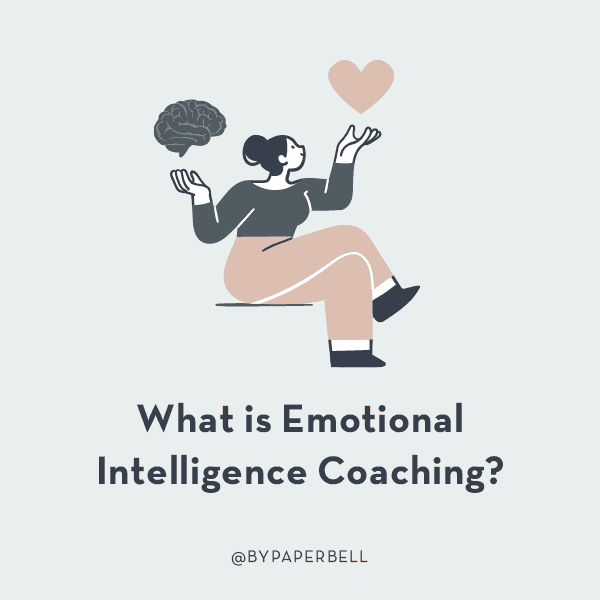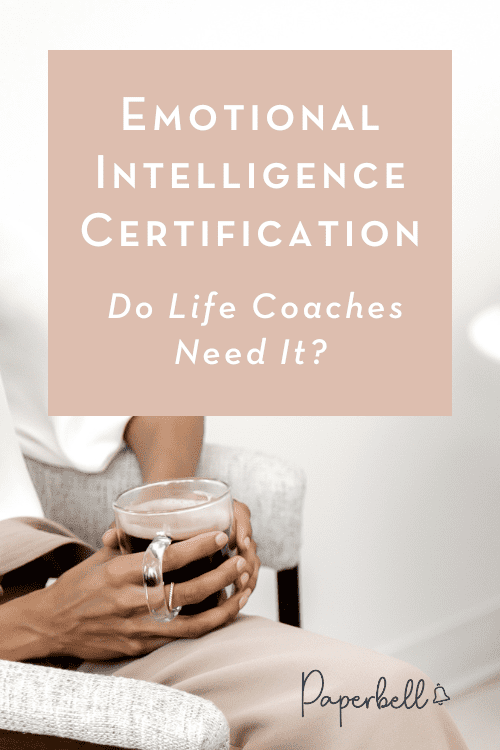An emotional intelligence certification is a valuable qualification for life coaches who want to help their clients improve their EQ.
This training equips coaches with the necessary tools to promote emotional awareness, social intelligence, mental health, communication skills, stress management, and more.
In this blog post, you’ll learn what it takes to become a certified emotional intelligence coach, including:
- What is emotional intelligence coaching?
- How to become an emotional intelligence coach
- How to get your emotional intelligence coaching certification
- FAQs about emotional intelligence certifications
What is Emotional Intelligence Coaching?

Emotional intelligence coaching is a kind of life coaching that helps people develop and improve their emotional intelligenc, or EQ. It allows people to build healthier relationships, make wiser decisions, and have a more successful life, both personally and professionally.
If you’re good at empathizing with others, communicating, and handling tough situations, you might make a great emotional intelligence coach.
An emotional intelligence coach helps clients through self-discovery by:
- Evaluating their client’s current level of emotional intelligence: Coaches can use assessment tools like questionnaires or interviews to figure out areas that need improvement.
- Setting goals for growth: Coaches work with clients to set goals for improving their emotional skills.
- Crafting personalized strategies: Coaches create action plans to help clients reach their goals based on what the client needs and wants.
- Motivating progress: Coaches provide support, encouragement, and accountability throughout the journey towards improved emotional well-being through regular check-ins and feedback sessions.
Effective emotional intelligence coaches have some distinctive qualities that set them apart from other coaching professionals. Developing these traits in yourself can be a great way to enhance your coaching practice in this specialty.
- Empathy: Emotional intelligence coaches are great at understanding and resonating with the emotions of others. They can put themselves in their client’s shoes to foster trust.
- Self-Awareness: These coaches possess a high level of self-awareness, allowing them to recognize and manage their own emotions effectively. This self-awareness is crucial for modeling emotional intelligence to clients.
- Active Listening: Emotional intelligence coaches are exceptional listeners. They go beyond hearing words, tuning into the emotional nuances of what clients express, and responding thoughtfully to those emotions.
- Non-Verbal Communication: Mastery of non-verbal cues is essential. Emotional intelligence coaches can pick up on subtle facial expressions, body language, and tone of voice, enhancing their ability to interpret and respond to clients’ emotional states.
- Cultural Sensitivity: Given the diverse ways emotions are expressed across cultures, these coaches need to display cultural sensitivity. They recognize and navigate the impact of cultural differences on emotional expression and understanding.
- Conflict Resolution: Emotional intelligence coaches are great at navigating conflicts by understanding the emotions involved. They guide clients through resolving conflicts with emotional intelligence and build healthy relationships.
- Positive Regard: Unconditional positive regard is another cornerstone trait for emotional intelligence coaches. They approach clients with genuine acceptance and support, creating a safe space for clients to explore and express their emotions.
- Flexibility: Adapting to the fluid dynamics of emotions requires a lot of flexibility. Emotional intelligence coaches can pivot their coaching approach based on the unique emotional needs of each individual.
- Mindfulness Practices: Many emotional intelligence coaches incorporate mindfulness techniques. They help clients develop awareness of their emotions in the present moment, fostering emotional regulation and clarity.
- Collaborative Approach: Emotional intelligence coaches often adopt a collaborative coaching style. They work with clients as partners, empowering them to explore and enhance their emotional intelligence through shared insights and strategies.
Do You Need Qualifications to Become an Emotional Intelligence Coach?
Although there are no legal requirements for coaching in general, having relevant qualifications can make you more credible and effective in your coaching niche. It positions you as an expert specialized in the problems of your future clients.
Being naturally great at navigating your own emotions isn’t the same as coaching someone through theirs. Even though you may have a high level of EQ and empathy, coaching also takes familiarity with certain frameworks and coaching tools to conduct impactful sessions.
Later in this post, we’ll cover the best accredited coaching programs you can take to get certified in this field.
How to Become an Emotional Intelligence Coach
1. Choose a Coaching Niche Related to Emotional Intelligence
Emotional intelligence is a coaching niche in and of itself. However, several other specializations are closely related to this area. For example:
- Emotional Wellness Coaching
- Relationship Coaching
- Mindfulness Coaching
- Communication Coaching
A general emotional intelligence life coach can work with just about anyone. But while that sounds great in theory, it’s not a great idea in practice.
For example, let’s say your dream client is a mother of adult children who wants to reconnect with those children. Instead of working with everyone, you can tailor your messaging to attract that exact type of person.
This way, you can carve out a portion of the coaching industry as your own.
Other clients that could be your target audience in this niche are:
- A high-level executive struggling to connect with their team members and foster a positive work environment
- Recently married couples looking to enhance their emotional intelligence to navigate the early stages of marriage and strengthen their connection
- A teenager experiencing bullying at school seeking emotional intelligence coaching to handle the situation better and build resilience.
- A retiree grappling with the emotional challenges of transitioning into retirement and seeking support in managing this significant life change.
- An entrepreneur dealing with high levels of stress and burnout seeking emotional intelligence coaching to handle better the pressures of running a business.
- A widow navigating the emotional complexities of grief and loss, seeking guidance to process emotions and find ways to move forward
- A college student feeling overwhelmed by the demands of academics and personal life, seeking emotional intelligence coaching for better balance and stress management.
- A healthcare professional looking to improve emotional intelligence to foster better connections with patients and provide more compassionate care
- A family facing interpersonal conflicts and strained relationships seeking emotional intelligence coaching to improve communication and understanding within the family unit
- A young adult on a journey of self-discovery, seeking emotional intelligence coaching to understand and manage their emotions, leading to personal growth
Here’s an example of a real-life coach working with emotional intelligence. Frederick Sanders, Ph.D., MCC, helps high-performing men of color awaken to their divine, authoritative power so they can generate their “next level” with intention, integrity, and vision:

Notice how this niche automatically disqualifies the majority of potential clients. However, his ideal client — high-performing men of color — will directly feel called to work with him.
The more niched-down you become, the smaller the pool of potential clients — but the more compelling you become to these exact people.
2. Create Offers and Coaching Packages
Having a clear niche will make creating your offers infinitely easier. Now, you can write a detailed description of your target audience, the problems they face, and the primary personal goals they have in mind.
Next, you can specify what coaching services you offer to this audience. You can sell individual coaching sessions, but a more effective approach is to come up with packages.
A coaching package describes everything a client gets when they buy from you. Instead of buying individual sessions, they pay for a “package” of sessions and other valuable add-ons.
Some examples of deliverables you can include in an emotional intelligence coaching package include:
- A set number of coaching sessions delivered over a specific time period (weeks or months)
- Voxer support in between sessions
- Workbooks with emotional intelligence exercises
- In-person retreats
- Self-paced video content to watch in between sessions
- Group coaching sessions
But what about the coaching offer?
Your offer shouldn’t focus on describing what’s included in your coaching package. Instead, it should sum up the promise or desired outcome clients can get when purchasing that package.
Consider this: What good will 12 one-on-one coaching sessions do if they can’t help your clients improve their EQ and get closer to their personal goals?
That’s why the package isn’t everything. Think of how you can make that package a more attractive offer by explaining your client’s transformation — aka the outcome they will receive by completing their coaching journey.
3. Land Your First Client
Finding your first client may seem tough, but everyone must start somewhere!
Seek referrals from friends, family members, or colleagues to clients who can benefit from improving their EQ skills.
You can offer a few free sessions at the beginning to test out your process and gain more experience. Just make sure you’re transparent about what you offer (and don’t offer) and treat these sessions exactly the same way as paid ones. Once you have some confidence, start offering your services for a fee to build a client base.
You can also use initial complimentary sessions to let potential clients experience what it’s like working with you. For instance, you could offer a free 30-minute consultation to assess a person’s emotional intelligence, suggest ways to improve it, and then offer a more in-depth program with additional sessions for a fee.
Last but not least, you can create limited-time offers for free trials of your services. For example, you can offer a free or discounted session for the first few clients who sign up. This can be a good way to expand client relationships, build more confidence in your practice, and create potential new referrals.
Free trials and discounted rates allow prospects to experience your services without making a large financial commitment immediately. If they’re impressed with the initial results and the vision you create for their transformation journey, they have the potential to become paying clients.
4. Start Marketing Your Emotional Intelligence Coaching Business
After your first client or two, you’ll have what it takes to scale your emotional intelligence coaching business to the next level.
But what got you here won’t necessarily be scalable. That’s why you should create a marketing plan that fits your coaching business goals.
For example, let’s say you can get one or two new coaching clients per quarter via word-of-mouth. If you have goals to onboard a new client each week, you’ll need a different approach!
Keep in mind that there’s more than one way to implement marketing for your emotional coaching business. What worked for another coach won’t necessarily work for you.
For example, don’t force yourself to publish a long-form blog post daily if you hate writing. Hire someone to write for you or focus on your strengths instead. This could be starting a podcast or speaking at an event.
Here are a few marketing strategies you can use to find new clients:
- Start a blog: Write about topics your ideal audience will search for. Your blog can become a source of trusted information and grow your brand. You can drive traffic to it through SEO strategies or Pinterest.
- Become a LinkedIn expert: You can get coaching clients on LinkedIn by posting and engaging with your ideal clients. This is especially true if you help career-driven people with their emotional intelligence.
- Make TikTok videos: Are reels your jam? You can get leads from TikTok if you enjoy sharing information through short and snappy videos.
- Grow your Instagram following: Not a fan of LinkedIn or TikTok? Instagram is another great social media platform that emotional intelligence coaches can use to build a following of potential clients.
- Run Facebook ads: This costs money, but it can help you reach a larger audience quickly. Work on your copy first, and A/B test some variations to reduce your advertising costs.
- Launch a coaching newsletter: Whether you’re building an audience from your blog, social media, or elsewhere, you can funnel those leads into your emotional intelligence coaching newsletter. Not sure how to grow your list? Here are 10 lead magnet ideas to help you attract more subscribers.
- Become a guest on other people’s podcasts: This is ideal for coaches who don’t yet have an audience of their own. You get access to other people’s audience while sharing your own expertise – it’s a win-win!
Remember not to burn yourself out by trying all of these marketing strategies at once. Start with one, become great at it, validate your offers, and go from there.
How to Get Your Emotional Intelligence Certification
You can start an emotional intelligence coaching business without a certification. However, a certification backed by a reputable organization like the ICF will give you an extra edge.
Here’s how you can get your emotional intelligence certification through ICF.
Research ICF-Accredited Programs
The first step towards becoming a certified emotional intelligence coach is researching ICF-accredited programs.
All of these programs meet rigorous standards set by the International Coaching Federation, so you can be confident you’re receiving quality training that aligns with current industry best practices.
Not sure where to start? We’ve gathered some of the best life coaching certification programs well-suited for emotional intelligence coaching and much more.
Select a Program That Fits Your Needs
There are plenty of ICF-accredited programs out there with different levels of certifications and specializations. Choose ICF-accredited emotional intelligence life coach training that fits the credential you prefer, namely:
- ACC (Associate Certified Coach)
- PCC (Professional Certified Coach)
- Or MCC (Master Certified Coach)
Emotional intelligence coaching will be a part of nearly all programs, so you won’t necessarily find one that solely focuses on this area. However, read the syllabus carefully to see if it takes up a big portion of the curriculum.
Here are just a few examples of programs you can consider taking:
- Institute for Professional Excellence in Coaching (iPEC): The Institute for Professional Excellence in Coaching (iPEC) is a well-known certified life coach institute. The best thing about this program is they run tons of in-person events that inspire and energize coaches. The program includes almost 400 hours of formal training, role-play, and writing exercises.
- Coach U: At Coach U, you’ll go through 77 hours of professional coaching training. It’ll take at least 6 months to go through this program. However, it’s self-paced, so you can easily adapt it to your lifestyle.
- Coach Training Institute: The CTI has been running its coaching training for over 20 years! So you can’t go wrong with this option. It’ll take 3 days and 6 months to complete, making it ideal for choosing your own learning pace.
- Coach Training Alliance: If you want to emphasize the business side of emotional intelligence coaching, this is the program for you. With this education, you’ll be able to market your business later on.
- The Certified Life Coach Institute: An ICF-certified coach training program that only takes 3 days? Sign me up! Although it’s not as comprehensive as other programs on this list, it’s a great option to dip your toes in emotional intelligence coaching before making a bigger investment.
These are only five options, but the ICF also offers an Education Search Service to help you find the ideal program for you.
Complete Your Training
Once enrolled in an accredited program, finish all the required courses and practical experience hours outlined by your chosen program. This may include:
- Attending workshops
- Participating in webinars
- Working directly with clients under supervision
- Attending in-person events
Earn Required Coaching Hours
You need to have coached a certain number of clients for a certain amount of hours to apply for an ICF credential at any level – ACC, PCC, or MCC.
Below is an explanation of what you’ll need for each of the credentials:
- Associate Certified Coach (ACC) – You must complete 60 hours of coach-specific education plus 100 hours of client coaching experience
- Professional Certified Coach (PCC) – You must complete 125 hours of coach-specific education plus 500 hours of client coaching experience.
- Master Certified Coach (MCC) – You must already have your PCC Credential, complete 200 hours of coach-specific education, and accumulate 2,500 hours of client coaching experience.
If you’re aiming for your PCC, keep in mind that it’ll take you much longer to accumulate and document 500 hours of coaching.
You always have the option to get started with 100 hours and apply for ACC accreditation. Later on, when you have more experience, you can apply for the PCC or MCC level.
Remember to keep track of your coaching hours throughout your training so you can submit them when you apply for certification. You can use Paperbell to track your ICF coaching logs more easily.
Become Familiar With Core Competencies
The ICF Core Competencies are essential skills that every certified coach should have.
For instance, the ICF Core Competency of ‘Establishing the Coaching Agreement’ requires coaches to clearly define the scope and goals of the coaching relationship with their clients.
You’ll need to show that you’re competent in these areas to pass the certification process. So, you should get to know them now. They’ll serve you for the rest of your coaching career!
Pass the Coach Knowledge Assessment (CKA)
The CKA online exam tests your understanding of coaching principles and ethics.
You need to pass this assessment to get your ICF credential.
Make sure you study and take practice tests before taking the official assessment. If you don’t feel confident about passing the exam, it’s better to put in more practice so you don’t have to retake it.
Submit Your Application
Once you’ve finished all requirements, it’s time to submit your application for certification with all documentation, i.e., your proof of training completion and client-coaching hours.
Paperwork isn’t our favorite part of coaching either, but it will all be worth it when you see the difference your coaching makes in people’s lives.
Here’s the silver lining: If you follow these steps and get your emotional intelligence certification from ICF, you can help clients develop their emotional intelligence skills while building a business you love.
Frequently Asked Questions About Emotional Intelligence Certifications
How Do I Become an Emotional Intelligence Expert?
To become an emotional intelligence expert, follow these steps:
- Gain foundational knowledge through books or online resources
- Attend workshops or seminars on emotional intelligence
- Pursue relevant certifications
- Practice applying emotional intelligence (EI) concepts in personal and professional settings
- Consider additional training, such as coaching or mentoring programs
What Are the 5 Domains of Emotional Intelligence?
The five domains of emotional intelligence, as proposed by Daniel Goleman, are:
1. Knowing one’s own emotions (self-awareness)
2. Managing emotions (self-regulation)
3. Motivating oneself (self-motivation)
4. Recognizing others’ emotions (empathy)
5. Handling relationships effectively (social skills)
What Is an Emotion Coach? Is It Different From EQ Coaching?
Professionals who call themselves emotional life coaches usually work with children to teach them how to navigate their emotions at an early age. An Emotion Coach helps kids understand their various emotions, why they feel that way, and how they can react to those feelings.
Emotional intelligence or emotional quotient (EQ) coaches are more known for working with adults. In this sense, their work is usually more tailored to the challenges grown-ups face. Still, technically, both of these specializations focus on the areas of life most affected by emotions.
How Much Do Emotional Intelligence Coaches Make?
The average emotional intelligence coach salary in the US is $52,326 per year. However, it doesn’t necessarily reflect how much you’ll make as an EI coach.
Your earnings are influenced by your years of experience, your personal brand, and your location. You can grow your income as an emotional intelligence coach by improving your qualifications and marketing strategies to attract more clients.
Launch Your Coaching Career With an Emotional Intelligence Certification
Becoming an EI coach is a great way to help people achieve their goals and be successful.
You can achieve your ICF certification quickly with the right knowledge, dedication, and commitment.
This type of coaching requires patience, understanding, and empathy – skills you’ll need to get your emotional intelligence certification.
Need help streamlining the admin side of your coaching business? With Paperbell, running a coaching business online has never been easier! Try it for yourself by claiming your free account.

Editor’s Note: This post was originally published in May 2023 and has since been updated for accuracy.









